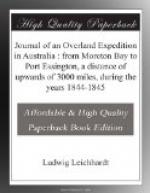thus occupied is in a continued state of excitement,
now buoyant with hope, as he urges on his horse towards
some distant range or blue mountain, or as he follows
the favourable bend of a river; now all despairing
and miserable, as he approaches the foot of the range
without finding water from which he could start again
with renewed strength, or as the river turns in an
unfavourable direction, and slips out of his course.
Evening approaches; the sun has sunk below the horizon
for some time, but still he strains his eye through
the gloom for the dark verdure of a creek, or strives
to follow the arrow-like flight of a pigeon, the flapping
of whose wings has filled him with a sudden hope, from
which he relapses again into a still greater sadness;
with a sickened heart he drops his head to a broken
and interrupted rest, whilst his horse is standing
hobbled at his side, unwilling from excessive thirst
to feed on the dry grass. How often have I found
myself in these different states of the brightest
hope and the deepest misery, riding along, thirsty,
almost lifeless and ready to drop from my saddle with
fatigue; the poor horse tired like his rider, footsore,
stumbling over every stone, running heedlessly against
the trees, and wounding my knees! But suddenly,
the note of Grallina Australis, the call of cockatoos,
or the croaking of frogs, is heard, and hopes are
bright again; water is certainly at hand; the spur
is applied to the flank of the tired beast, which already
partakes in his rider’s anticipations, and quickens
his pace—and a lagoon, a creek, or a river,
is before him. The horse is soon unsaddled, hobbled,
and well washed; a fire is made, the teapot is put
to the fire, the meat is dressed, the enjoyment of
the poor reconnoiterer is perfect, and a prayer of
thankfulness to the Almighty God who protects the
wanderer on his journey, bursts from his grateful lips.
May 25.—We travelled about eight miles
down the Lynd. The country was very mountainous;
granitic and pegmatite ranges bounded the valley on
both sides.
May 26.—We continued our journey over the
most mountainous and rocky country we had ever passed.
The ranges formed the banks of the river itself, and
even entered its bed, which gradually enlarged and
was frequently formed by several channels fringed
with large drooping tea trees. At the end of
the stage, basalt was found to have broken through
the granite.
May 27.—The river turned more to the northward,
and, joined by many gullies, wound its way between
wild and rocky, though low ranges. At a place
where it left a range of rugged little peaks, basalt
re-appeared at its banks, and extended for some distance,
now filling flats with its rough and cellular blocks
and pebbles, and again forming small hillocks of black
bare rock. As soon, however, as the river had
fairly left the basaltic formation, fine large flats
of a light sandy soil succeeded on both sides; on
which Pandanus spiralis grew in great abundance, and
to a larger size than we had seen before. The
bed of the river became very broad, and was covered
with sands, shingle, and pebbles of the rocks of its
upper course. I passed through a broad rocky gap
of a range tending from east to west, and, at about
two miles beyond and to the north-west of it, we encamped,
in lat. 17 degrees 54 minutes 40 seconds.




